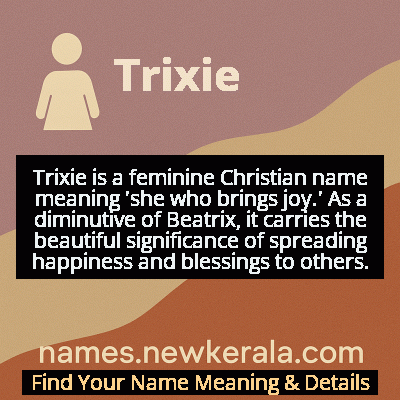Trixie Name Meaning & Details
Origin, Popularity, Numerology Analysis & Name Meaning of Trixie
Discover the origin, meaning, and cultural significance of the name TRIXIE. Delve into its historical roots and explore the lasting impact it has had on communities and traditions.
Name
Trixie
Gender
Female
Origin
Christian
Lucky Number
4
Meaning of the Name - Trixie
Trixie is a feminine Christian name meaning 'she who brings joy.' As a diminutive of Beatrix, it carries the beautiful significance of spreading happiness and blessings to others.
Trixie - Complete Numerology Analysis
Your Numerology Number
Based on Pythagorean Numerology System
Ruling Planet
Uranus (Rahu)
Positive Nature
Strong sense of order, loyal, practical, and disciplined.
Negative Traits
Stubborn, overly serious, rigid, and prone to feeling restricted.
Lucky Colours
Blue, gray.
Lucky Days
Saturday.
Lucky Stones
Blue sapphire.
Harmony Numbers
1, 7, 8.
Best Suited Professions
Managers, engineers, accountants, organizers.
What People Like About You
Dependability, discipline, practicality.
Famous People Named Trixie
Trixie Friganza
Actress and Vaudeville performer
Popular vaudeville star and Ziegfeld Follies performer known for her comedic timing
Trixie Whitley
Singer-songwriter and musician
Belgian-American musician known for her soulful vocals and work with Daniel Lanois
Trixie Mattel
Drag queen and musician
Winner of RuPaul's Drag Race All Stars 3, known for her folk music and comedy
Trixie Belden
Fictional detective character
Protagonist of popular mystery book series for young readers
Name Variations & International Equivalents
Click on blue names to explore their detailed meanings. Gray names with will be available soon.
Cultural & Historical Significance
Throughout the 20th century, Trixie maintained its association with playful energy and charm while carrying the weight of its more formal Latin origins. The name's use in vaudeville and entertainment circles reinforced its connection to performance and joy-bringing. In recent decades, Trixie has experienced a cultural renaissance, particularly through LGBTQ+ communities and drag culture, where it has been reclaimed as a symbol of bold self-expression and joyful authenticity. This modern reinterpretation maintains the name's core association with bringing happiness while expanding its cultural relevance to contemporary social movements.
Extended Personality Analysis
Individuals named Trixie are typically perceived as energetic, cheerful, and charismatic. They often possess a natural ability to uplift others with their infectious optimism and playful demeanor. The name suggests someone who is socially adept, quick-witted, and enjoys being the center of attention in positive ways. Trixies are often seen as creative problem-solvers who approach challenges with enthusiasm and innovation. Their lively nature is balanced by a genuine warmth and empathy, making them excellent friends and companions.
The diminutive form of the name suggests approachability and friendliness, while the root meaning of 'bringing joy' indicates someone who naturally spreads positivity in their social circles. They tend to be adaptable and resilient, able to maintain their cheerful disposition even in difficult circumstances. Trixies often exhibit strong communication skills and a talent for making others feel comfortable and valued. Their personality combines the depth of their Christian name roots with a lighthearted exterior, creating individuals who are both spiritually grounded and delightfully spontaneous in their interactions with the world.
Modern Usage & Popularity
In contemporary naming practices, Trixie has emerged as a vintage-chic choice that balances tradition with personality. While it remains outside the top 1000 names in most English-speaking countries, it has seen steady usage among parents seeking distinctive yet familiar names. The name's appeal lies in its cheerful connotations and retro charm, fitting well with the current trend of reviving vintage diminutives. Social media and pop culture have significantly influenced its modern perception, with drag performer Trixie Mattel bringing contemporary relevance and expanding the name's association with creativity and bold self-expression. The name maintains its Christian roots while adapting to modern sensibilities, making it particularly popular among families valuing both tradition and individuality in their naming choices.
Symbolic & Spiritual Meanings
Symbolically, Trixie represents the embodiment of joy and the transformative power of positivity. The name carries deep metaphorical significance as a beacon of lightheartedness in a often serious world, suggesting someone who can find and create happiness wherever they go. In Christian symbolism, it connects to the concept of being a blessing to others and embodying the fruits of the Spirit, particularly joy and kindness. The diminutive nature of the name symbolizes approachability and warmth, representing the idea that great joy often comes in small, unexpected packages. Metaphorically, Trixie signifies the ability to maintain childlike wonder and optimism while navigating adult responsibilities, serving as a reminder that joy is both a gift to receive and a virtue to cultivate in daily life.

